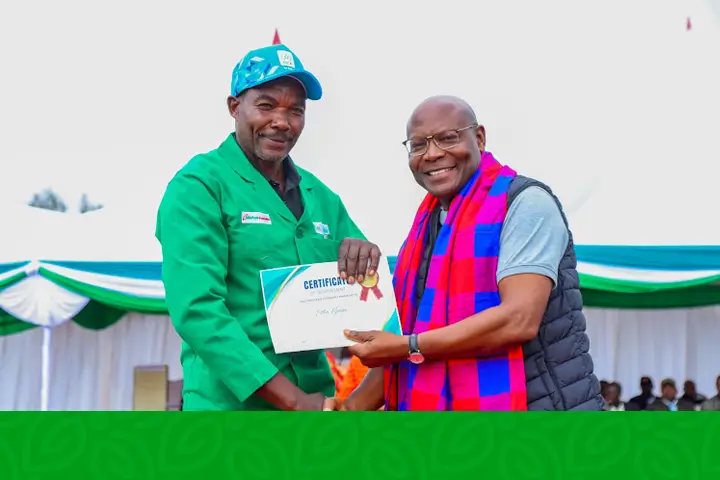
In a remarkable stride towards sustainable agriculture and economic empowerment, over 700 farmers in Kajiado County, Kenya, have successfully completed climate-smart agriculture training under the Safaricom Foundation’s Wezesha Agri-Programme. This groundbreaking initiative, a partnership between Kajiado County, Africa Instore Solutions (AIS), Endev, and Safaricom’s Digifarm, represents an investment of Sh23 million ($23 million) over 18 months. Beyond education, this comprehensive program equips young farmers with entrepreneurial skills, paving the way for thriving agribusiness opportunities.
A Vision for Transformation:
Joseph Ogutu, Chairman of Safaricom Foundation, elucidated that the Wezesha Agri-Programme takes a holistic approach to empower farmers. It encompasses vital components such as training in Good Agricultural Practices (GAP), access to demo farms, mentorship in agricultural technology and innovation, and collaboration with partners to establish markets for the farmers.
Youth Empowerment through Agriculture:
“Wezesha Agri seeks to enable the youth to make economic strides and establish profitable agribusiness ventures. So far, we have had over 1000 farmers graduate from this program. We look forward to transforming the lives of more Kenyans through the provision of economic empowerment opportunities,” expressed Ogutu.
Safaricom Foundation’s Commitment:
In its 2023-2026 strategy, Safaricom Foundation has integrated agribusiness, enterprise development, and ecopreneurship as key pillars of its economic empowerment programs. This approach demonstrates the foundation’s dedication to fostering a sustainable and resilient agricultural landscape in Kenya.
A Demo Farm for Capacity Development:
As part of its training efforts, the Wezesha Agri program has established a demonstration farm in Kuku Ward, Kajiado South subcounty, aimed at supporting and empowering 1000 women and youth through capacity development. Agriculture Extension Officers from the county government collaborate with farmers at the farm, offering practical training in agricultural best practices.
Guardians of the Environment:
The initiative is timely given the challenges Kenyan farmers face due to climate change. Farmers across the nation have sought climate-smart technologies to combat the adverse effects of unpredictable weather patterns. These technologies aim to increase agricultural productivity, enhance resilience, and minimize greenhouse gas emissions.
A Global Perspective:
The United Nations- Food and Agriculture Organization (FAO) defines climate-smart agriculture (CSA) as an approach to transform agri-food systems towards green and climate-resilient practices. CSA seeks to sustainably increase agricultural productivity and incomes, adapt and build resilience to climate change, and reduce greenhouse gas emissions.
Kenya’s Climate-Smart Agriculture Framework:
In line with this global perspective, Kenya has developed the Kenya Climate Smart Agriculture Implementation Framework, 2018-2027 (KCSAIF). This framework envisions a climate-resilient, low-carbon growth sustainable agriculture sector that ensures food security and contributes to national development goals in alignment with Kenya Vision 2030.
In summary, the graduation of 700 farmers from the Wezesha Agri-Programme marks a significant milestone in Kenya’s journey towards sustainable agriculture and youth empowerment. As these graduates apply their newfound knowledge and skills, the nation moves one step closer to achieving food security, economic growth, and environmental sustainability.
Stay updated with the latest farming tips and agriculture industry news from Africa by subscribing to our newsletter. Don’t miss out on valuable insights and updates. Follow us on Twitter, LinkedIn, and Facebook to join our farming community and stay connected with us.



















